

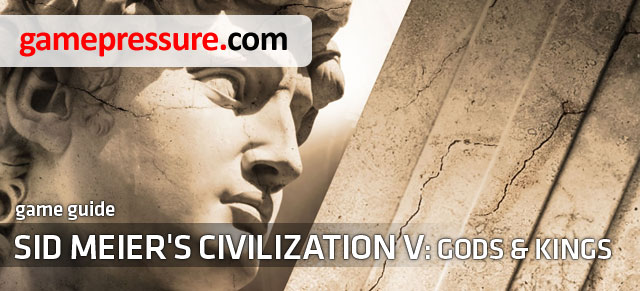
The Gods & Kings expansion pack to Civilization V enriches the gameplay with completely new elements which additionally complete the measures you can use to control your empire. In this guide I will focus on solving the mysteries brought with the expansion, including among others:
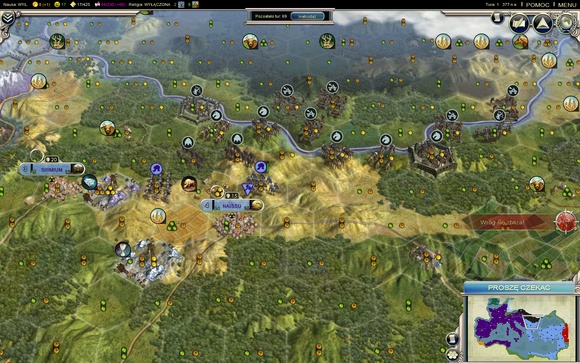
The following colours have been used in the guide:
Dawid "Kthaara" Zgud ()
Translated to English by Jakub "cilgan" Lasota
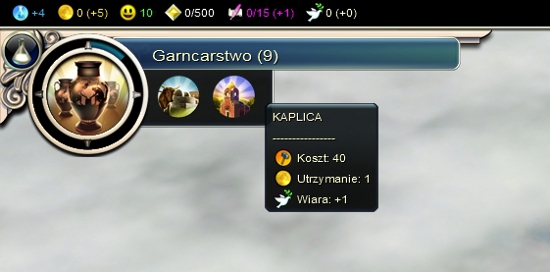
The Faith system fills up the gap created by the basic game, in which there was no option like this.
Each part of this system requires Faith points. You can obtain them just like Culture - by building new building and (with time) making new geographical and technological discoveries and thanks to City-States.
The impact of the Faith system on the game is considerable. Each civilization can have its own Pantheon, but not each can start a religion. Usually, the number of religions that can be started is less than half of the players in the game. That's why you should do it as soon as possible. The one controlling a religion has influence on all its followers. If our religion has a bonus depending on the number of followers (e.g. Tithe - 1 gold per turn for every 4 followers), it's important for it to spread as much as possible. Thanks to religions, you can also summon Great Prophets and build some buildings thanks to Faith points.
Of course we should care about having our own religion and not believing in something not fitting us. That's why the first technology you should develop after setting a city is Pottery. Thanks to it you will be able to build a Shrine - the first building giving you 1 Faith per turn. With time you should learn more technologies, letting you build further religious buildings.
After building a Shrine and waiting a few turns, it's time for the next step...
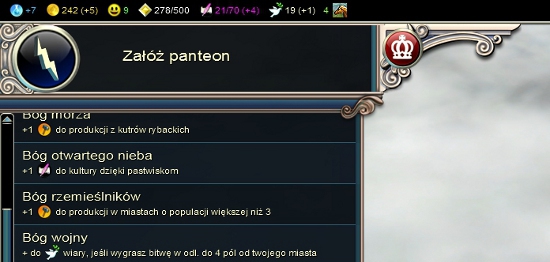
The first step to starting your own Religion is collecting a dozen or so Faith points. You can get them by exploring ruins, from City-States and by building a Shrine. Once you have enough (usually 10-15, depending on the map) you will be able to start your own Pantheon - the main pillar of Faith. There are numerous possibilities - as much as 22 - though you must choose only one. Choose wisely! You cannot change your decision later on, just polish it.
Each option has a certain bonus to collecting a given resource or to a different aspect of the game. I won't try to point out the best one - you should decide what's best for you.
Overall no option gives us a large development boost, though there are a few more useful. The ones influencing production seem a good choice - though you should check out which are more useful for you. The option which increases the food growth is also useful, as the city will develop faster.
The only option for those who want to use Faith to boost science is the +2 Science in cities with a Trade Route. Overall, not very useful further on in the game. As pretty much every option really.
Apart from that, most Religions focus on gathering Faith - which is useful for buying units, but only those low level ones....
After creating a Pantheon, you will have to wait a bit. In order to start your own religion, your civilization must give birth to a...
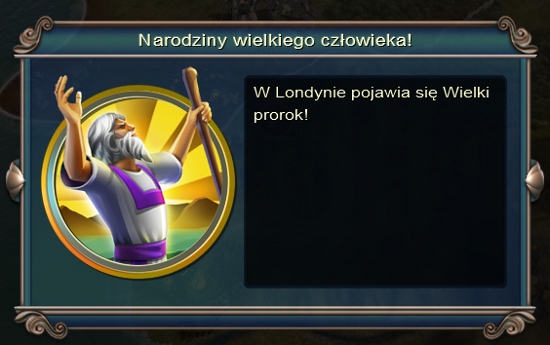
The Great Prophet can do a number of things:
The best way of obtaining the first Great Prophet is investing in... Culture and the Liberty tree. In return for filling up the whole tree (spending six points) you will get one free Great Prophet. With your civilization developing at a proper rate, you should have the social policy tree filled up way before you can obtain him with Faith.
After obtaining the Great Prophet, send him to one of your cities (at best the capital) and choose "Found Religion"...
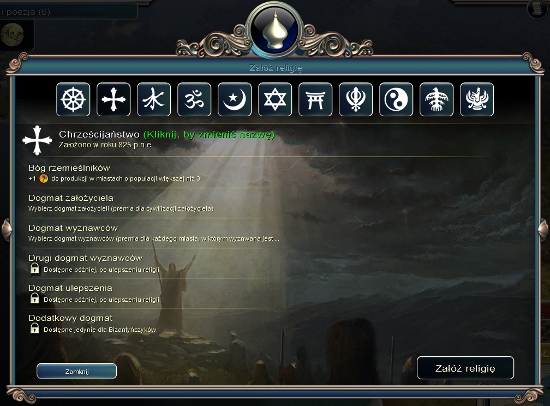
Founding a religion is most of all making a few choices - firstly the symbol and name. You can already see your basic Belief (bonus, right below the name), to which you can add two more - a Founder and Follower Beliefs.
The Founder Belief is a bonus just for you - as you have founded the religion. The range of these bonuses is vast - you have to decide on something. Generally it's better to take something tangible - that is gold. If you're however planning on aggressively expanding your religion, you might want to choose an option which gives you Science for each converted citizen.
Follower Beliefs are bonuses given by followers of a given religion present on a given territory. One of the best is adding 1% production for each follower in the city.
Now you can also choose an additional Belief if you're playing as the Byzantines. You choose is from the available Pantheon Beliefs, which is very good as their bonuses are the largest.
From now on, the Faith points start to be useful - you can use them to buy certain buildings (Cathedral, Monastery, Mosque, Pagoda) is you choose a proper Belief, spend on special units (Missionary and Inquisitor) and also pre-industrial units after choosing a proper Belief.
If you decide to use another Great Prophet, you can (or even should) improve your religion. That way you can add two additional Beliefs to it.
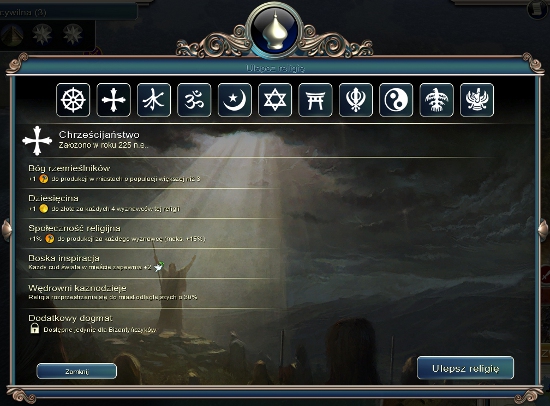
The second Follower Belief can be chosen from the ones left. The list becomes smaller as new religions are created, so it's best to improve yours as fast as possible.
Enhancer Beliefs let you improve the possibilities of spreading your Religion. You can choose between various ways of influencing the followers. The possible options are, for example, increasing the speed at which the City-States are converted or the power of missionaries.
Only after enhancing your religion can you use Faith to summon Inquisitors. It's a useful unit in case a different religion starts in your city. You can't always fully convert all infidels, though an Inquisitor can root out a religion - all infidels will become pagans or convert to the dominating religion.
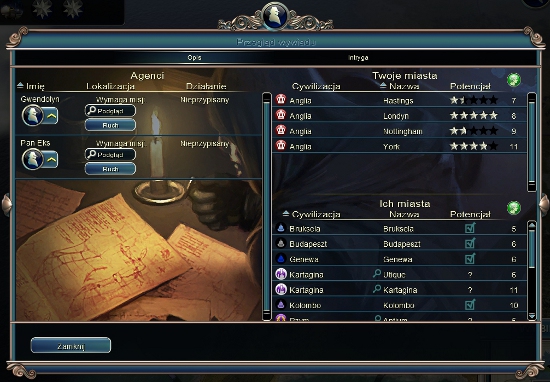
This aspect of the game becomes unlocked after one of the players reaches Renaissance. From now on, each player will receive one Spy for each next era (Renaissance, Industrial, Modern, Atomic, Information), making a total of five. You can also receive an additional one for the National Intelligence Agency wonder.
Spies can infiltrate other cities and steal technologies found there, which is also their main "offensive" use. Apart from that, if they're inside an enemy city, they gather other useful information, for example regarding invasion plans. Looking inside the enemy city is also possible.
"Defensive" Spies are set in your own cities. Above all they slow down enemy Spies which is useful during war. Their second use is protecting your technology from being stolen.
Spies don't have a large influence on the gameplay if you have a technological advantage over your rivals. It's then better to have them guard your own cities or pull off coups in City-States, thanks to which you will earn their favour.
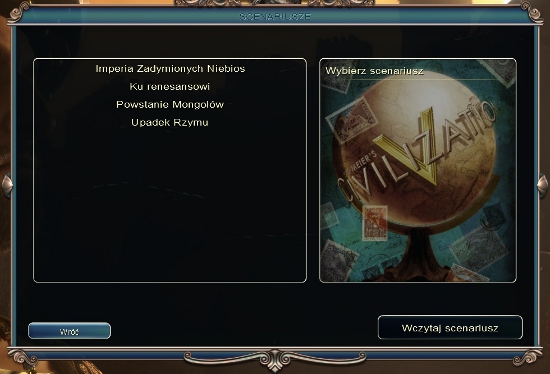
Scenarios are something like separate games in the game - most of the time they have their own map and civilizations, out of which each one has their own units. Scenarios also have their own technologies and Social Policies. All four are a good idea to expand your experience with Civilization V Gods & Kings. It's worth playing them in order to get more fun from the game.
The "Empires of the Smoky Skies" is by far the most interesting scenarios. The developers let their imagination go wild and created a world dominated by steam-powered machines.
In this chapter I will try to present the problems which can occur while playing these maps, as well as principles during each of them.
You should read the description of each scenario - it's available while choosing the difficulty and (optionally) map and civilization. The goals and special rules are in force are described there. Those rules are also available during the gameplay.
In this scenario you will face the problems of Rome. Its rulers see that their power is instable, while the local lesser lords and preparing to attack their outposts. Will you take control of the Romans or Barbarians?
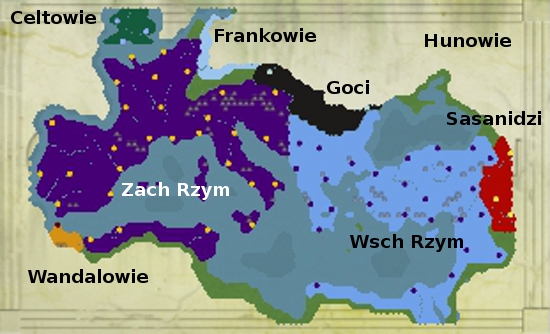
You can begin as the ruler of one of the Rome parts - Eastern or Western, as Persians or one of the five Barbarian lords. The game automatically ends after 70 turns - points count, so while playing as Sassanid, Goths, Celts, Huns, Vandals and Franks you need to conquer. On the other side, the Romans must protect themselves from the enemy armies. Pretty much everybody is at war with everybody - only the two Roman empires are allies.
Beginning as the Barbarians, you will receive only a small part of the map and a considerable army. The Roman Empire on the other hand, occupies pretty much the whole map. You objective is to reduce the number of their cities as much as possible.
Each player has all the Ancient and Classical Eras technologies unlocked. All the structures connected with Science are locked - you don't gather any new points or invent new technologies. Religion is also deactivated - you can't create new ones and there aren't any present on the map. Settlers cannot be created, so you cannot establish new cities.
You have eight civilizations to choose from:
Each player has access to one of three Social Policy tree:
If you fill up the whole tree before the 70th turn, you will receive gold in the amount of one third of the Culture income.
Winning this scenario depends mostly on the chosen civilization and the tactic:
Attention! This scenario is only available if after clicking on the DLC option in the Menu you have a visible "Mongolia under Genghis Khan"
Genghis Khan - this name put fear amongst many. His empire had thousands of kilometres. Will you be able to satisfy the appetite for conquer, or surrender to your neighbours and forever be excluded from the pages of history?
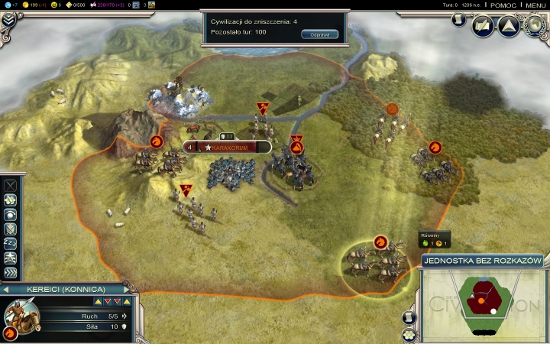
You don't have a choice regarding the civilization in this scenario. You will be the leader of the Mongols and will have to conquer at least four big civilizations around you in least than 100 turns. Higher difficulties raise the requirements.
There are lots of City-States to be conquered and additionally a couple civilizations with a few cities. Each plundered city gives you gold, culture and a free social policy, additional units and much more...
You can play only as the Mongols.
Mongols - Mongolian Terror - Civilization oriented solely on conquering cities. They have great Mounted units for it. Bonus: +30% Combat Strength when attacking City-States units and the Cities themselves. Mounted units have +1 move. Special units: Keshik - (more moves and experience, can move after attacking), replaces the standard Knight and Chan - (moves faster and has more health), replaces the Great General.
You have access to the standard Policy trees. Four points are assigned to Honour from the very start.
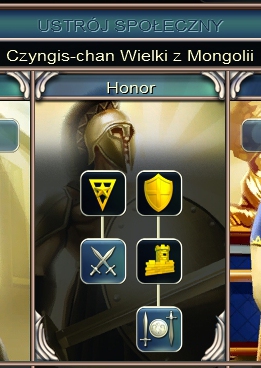
You begin the game with one city (Karakorum), two Workers, one Keshik, one Chan and four Horsemen. It's worth to upgrade those you can to Keshiks. The technology tree is unlocked fully, but the game ends after 100 turns so you should focus on developing technology, instead focusing on conquering your neighbours. There a few civilizations waiting to be defeated, including China, Sayam, Indie and Japan.
Use the Mongols strong sides: they have a +30% attack bonus against City-States. They also have a great mounted unit - Keshik - capable of attacking a city and afterwards retreating from the range of its attacks.
This scenario is challenging even on lower difficulty levels. Its main focus is conquering new cities, the amount of which will increase fast and so will the dissatisfaction of the citizens, which will reach rock bottom after a while. When the happiness level drops below zero (a red number will appear on the bar at the top of the screen), the level at which your civilization grows will drop to 25% of its normal value. Apart from that, the conquered cities will still resist you, so you will have to wait quite a long time before building a Courthouse.
Crusades are a result of a great struggle for control over the Holy City of three religions: Jerusalem. Will you manage to lead a successful offensive and take over the city? Or perhaps your might ends up defeated by an enemy empire, which currently reigns over the Holy City? Finally, will you survive those dark ages and will you have the strength to step on the path into the Renaissance?
Scenario is based primarily on historical Europe, but it permits... drawing of the map.
From the beginning there are three religions on the map: Roman Catholicism, Eastern Orthodoxy and Islam. The game, naturally, does not allow the creation of new ones. The Holy City of the first one is the Vatican City, the second one - Constantinople, from the beginning belonging to Byzantium (it is the only civilization which controls a Holy City from the beginning) - and for Islam - Mecca. At the beginning, Jerusalem, Constantinople and Mecca are each a free city-state. Provided that we control any of the Holy Cities, we will receive a bonus from the dogma of the founder's religion.
The game is all about the points, and it ends after 200 turns. For each turn of control or alliance with the Holy City or Jerusalem, we obtain 10 additional points. Sending a caravel to the West, discovering the Exploration (New World), being elected the Emperor of Germany or seizing control over cities of other religion is another way of gaining additional points.
Each civilization starts at the beginning of the era of the Middle Ages - technologies of Ancient and Classical era are long discovered. Furthermore, it also receives two units of Settlers, one unit of Workers and a specific quantity of military units. Playing as a Christianity nation, the location of Vatican City and Jerusalem is marked on our map - Mecca and Constantinople are hidden. In turn, playing as an Islamic nation, the location of Mecca and Jerusalem is shown to us.
We can choose from a variety of civilizations, existing in the then Europe - some of which have been modified in the actual gameplay.
England - originally: +2 to movement speed of naval units.
Austria - originally: can spend 500 gold to take over allied city-state.
The Celts - change: +20% additional strength against units of a civilization with more cities (instead of additional faith from upgraded forests).
Sweden - change: embarked units gain additional movement point and their embarkation / disembarkation costs only one movement point, instead of a whole turn (instead of additional influence on Great People).
Spain - change: after discovering Exploration, they can send Conquistadors, who will gain additional victory points and gold (instead of gold from the discovery of Natural Wonders).
The Turks - originally: they can convert barbarian naval units to join their side, and gain additional gold for doing that.
The Netherlands - originally: they retain 50% of the happiness benefits from a Luxury Resource if they lose it.
Egyptians (Ayyubids) - new nation - Saladin's Justice - Bonus: in every conquered city, a free court is built. Additionally, they have free Pyramids in Cairo. Special: Mamluks - (no penalty for attacking cities), they replace Knights and Madrasa - (+33% Science from the city, +2 Faith, +2 Science from the jungle), it replaces University, which does not give Faith.
Arabian (Almoravids) - change: +2 gold from each Trade Route (instead of +1 gold from each Trade Route and double quantity from Oil resources).
Russia - change: +1 movement speed for land units, additionally movement along the river costs one movement point (instead of additional production and doubling of strategic resources)
Byzantium - change: you begin with an additional Spy and a Holy City (instead of additional Faith when establishing a religion).
France - original: each city gives +2 Culture each turn.
A good strategy for completing this scenario with a decent score, is to acquire and hold alliances with Holy Cities, and, if it's possible, complete their side quests - you gain Points of Influence for doing so, although those points drop down very fast.
When playing as Byzantium, you must prevent any enemies from getting into Constantinople - your top priority should be to maintain control over it, as it gives you points and religious bonuses.
Discovering the steam engine caused the history of Earth to take a turn to an alternative route. Tracked vehicles like the Landship and Airships in the sky, all powered by steam and coal are a normal view, while ships powered by a strange green substance known as Luboric can be seen in the sea. Will you survive in the times of Steampunk? And most importantly, will you win?
Overall
The scenario doesn't resemble any others - it's not based on real events, but a variation on steampunk. Everything is powered by steam engines here - tracked vehicles, airships and ships on the sea.
Gameplay parameters: the map is SMALL, speed NORMAL, one turn last one year - you begin in 1800. The map in this scenario can be fully randomized; you have a list with available terrain. There are no free military or religious cities on the map; in fact religion is switched off completely. Strategic resources have been also changed - in place of Aluminium there's Aetherium and Uranium has been replaced with Luboric.
Each player begins with three groups of Settlers, two Workers, two Scouts and two Land Ironclads. Each group of Settlers starts a city with four citizens and a set of buildings including a Monument, Library and a couple more starting ones.
You have five fictional civilizations to choose from - each one of them reached the technology of Steam Engine. Each one also has a different bonus to a given aspect of the game and has a specific building to build, which gives more bonuses - developing a given technology gives access to it. Everyone also have all the technologies including the Industrial Age. The tree has been modified and all technologies are now connected with the power of steam.
You also receive three Spies at the start - it's worth to keep two in your own country to counter enemy Spies and send one to your enemies for information.
Players
You can choose from five fictional technocratic civilizations. Generally each one represents a different gameplay approach.
Technology
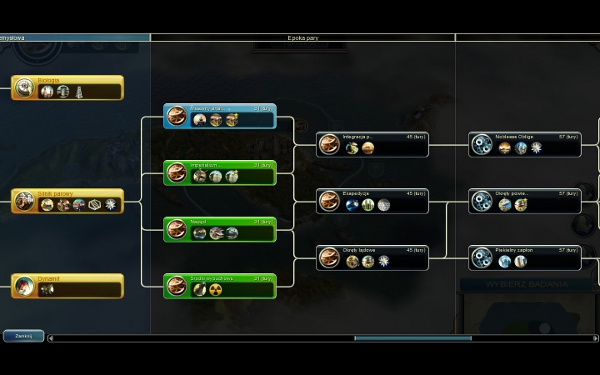
The tech tree is completed all the way to the Industrial Age. The most important invention is the Steam Engine - because of it, from the start we will be able to build Railroads, Land Ironclads and ... Landships.
It's where the new steam technology tree begins - anyone who's ever played a game set in this scenery should have an idea of what technologies can be found on it. The new technologies are divided into three eras - steam, airship and future.
At start we can build three industrial age wonders: Louvre, Big Ben and The Brandenburg Gate. As you discover new technologies, you will gain access to new ones (most of the real) like The Statue of Liberty, Eiffel Tower, as well as the Analog Machine or Perpetual Mobile.
There are as many orders of discovering the technologies as there are gameplay strategies. I described the technologies order for each party:
Social Policies
You have five trees to choose from. Each is available to anyone from the very beginning. You can connect points from given trees. Each represents a given aspect of a country - production, army, commerce etc. At the beginning, right after building the first city it is worth to allocate policies - you have Culture for three points.
Overall the policies are grouped so that each civilization can focus on one of them. The Vedria however doesn't have its own tree, while bonuses to production are always welcomed.
Victory
Basically you can win in two ways - by wiping out all the opponents or diplomatically, by becoming the leader of the League of Empires. The latter one is easy - you just have to hold three titles (form the below ones) for five turns:
Whenever you get three titles (it's rather easy), your neighbours will start being problematic almost instantly. They will stop trusting you and start condemning and will try to take your place in at least one title. You have to survive five turns of their attempts to win the scenario.
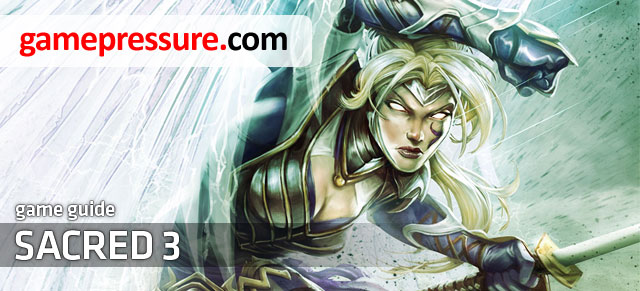

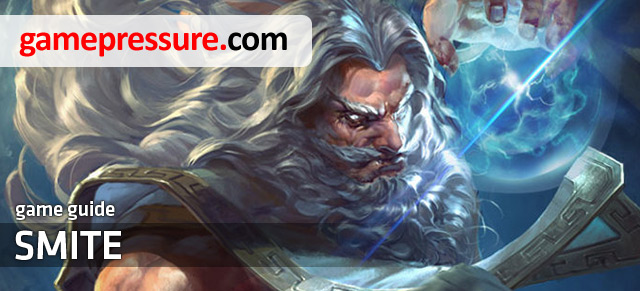

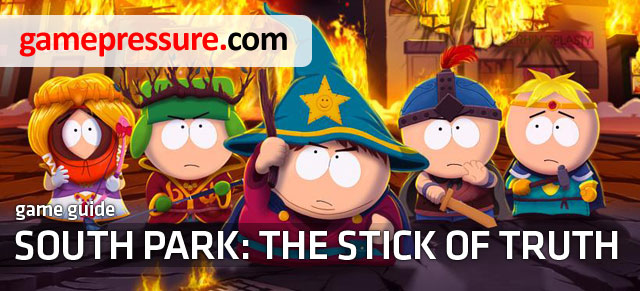 South Park: The Stick of Truth Game Guide & Walkthrough
South Park: The Stick of Truth Game Guide & Walkthrough Starbound Game Guide & Walkthrough
Starbound Game Guide & Walkthrough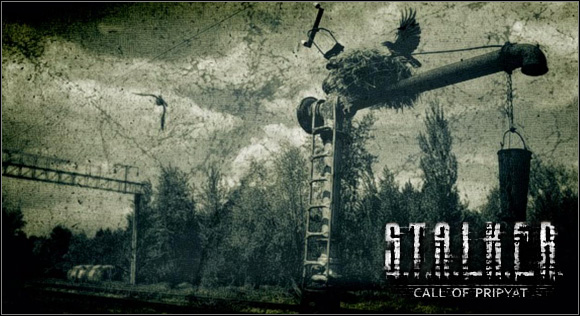 S.T.A.L.K.E.R.: Call of Pripyat Game Guide & Walkthrough
S.T.A.L.K.E.R.: Call of Pripyat Game Guide & Walkthrough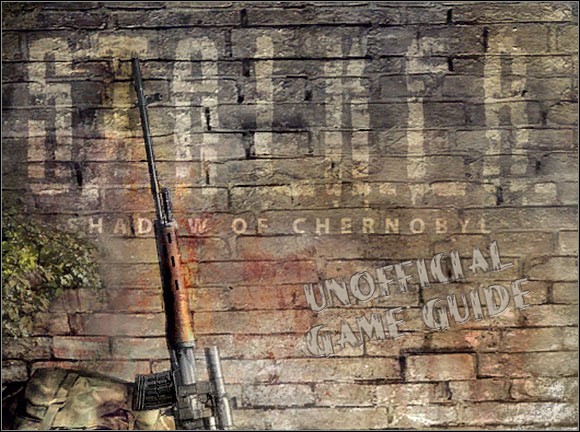 S.T.A.L.K.E.R.: Shadow of Chernobyl Game Guide & Walkthrough
S.T.A.L.K.E.R.: Shadow of Chernobyl Game Guide & Walkthrough Sam & Max: Season 2 Game Guide & Walkthrough
Sam & Max: Season 2 Game Guide & Walkthrough